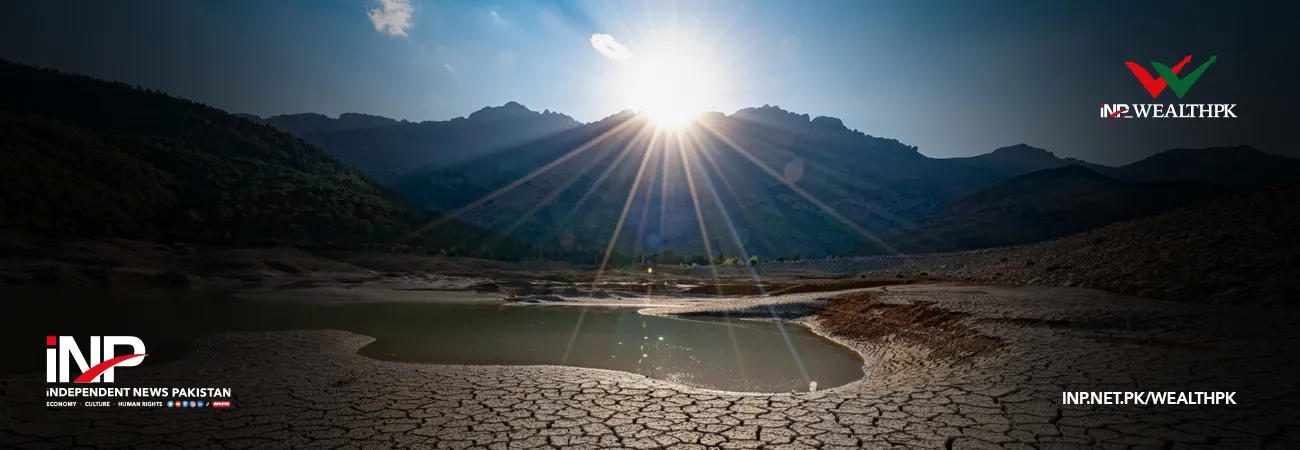i INP-WEALTHPK
Amir Khan
The convergence of climate change and water scarcity is straining Pakistan's resources and threatening its economic and food security, Ahmad Aslam, environmental specialist at the World Bank, told WealthPK. Pakistan contributes less than 1% of the world's carbon emissions, yet it is one of the most vulnerable countries to the effects of climate change. According to the Global Climate Risk Index, Pakistan ranks as the fifth most climate-vulnerable country in the world. The global temperature is rising at a rate of 0.6 degrees Celsius annually in Pakistan. This is causing glaciers to melt and rainfall patterns to change, putting a strain on Pakistan's water resources.
As a result, approximately 80% of the population faces severe water shortages for at least one month each year. The groundwater resources are being overexploited, as the surface water becomes scarce. This is leading to a decline in the water table and an increase in the risk of water pollution. Without timely and comprehensive action, the situation is projected to deteriorate further, with the entire country facing a severe water scarcity crisis by 2025. Pakistan is facing a severe water crisis. A report from the Pakistan Institute of Development Economics (PIDE) ranks the country as the 14th out of 17 very high-risk countries affected by water scarcity.
This is due to the wastage of over one-third of available water, which is a result of poor management. The latest UN report indicates that by 2050, the country's population could exceed 366 million. This will put a strain on the already limited water resources, as the demand for water is projected to reach 274 million acre-feet (MAF) by 2025. However, the available water supply is only 191 MAF. This growing demand-supply gap is expected to exacerbate due to the increasing population and inadequate water management. The government needs to take urgent action to address the water crisis, or else the country will face serious consequences.

"At the core of Pakistan's water resources lies the Indus River and its tributaries, responsible for irrigating an astonishing 48 million acres of cultivable land," said Ahmed Aslam. "Complementing this vital source is the groundwater obtained through an extensive network of 1.2 million tube wells, contributing an enormous 50 million acre-feet to the nation's water reserves. This expansive water network sustains Pakistan's growing population and its ever-increasing agricultural needs." Ahmed also pointed out that agriculture is a major economic driver in Pakistan, employing over 40 million people and providing food for the nation.
However, the country is facing a serious water crisis. The amount of fresh drinking water available per person has declined to less than 1,800 cubic meters per year (m3/y), and is projected to drop to less than 1,000 m3/y by 2035. This means Pakistan is shifting from a water-stressed country to a water-scarce country. He said the decline in water availability was due to a number of factors, including population growth, climate change, and inefficient water management. Ahmed noted that the river water levels were also projected to decrease to 800 cubic meters per year (m3/y) by 2026 due to the population growth, which will have a devastating impact on agriculture as well as the economy.
He warned that the water crisis could lead to food shortages, economic instability, and social unrest and urged the government to take urgent action to address the water crisis, or else the country will face serious consequences. Ahmed said the water predicament extends beyond agriculture, affecting domestic needs, industries, power generation, and municipal services. He explained that climate change is exacerbating the water crisis by straining these sectors and eroding Pakistan's diminishing water reserves. Bleak predictions forecast that Pakistan could lose up to 40% of its freshwater reserves by 2040 – a catastrophic scenario with repercussions for the economy, food security, and public well-being.
Credit: INP-WealthPk




